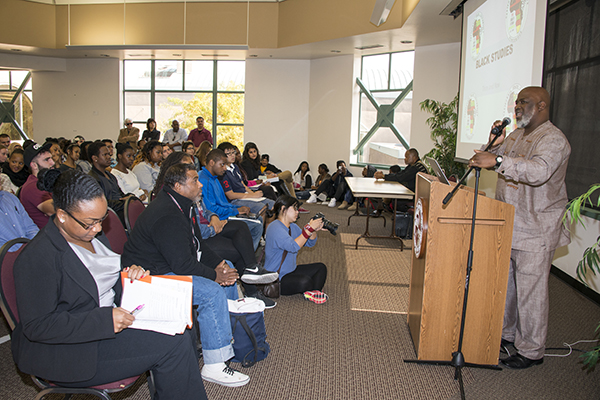Pan African Studies Celebrates History

Akinyele Umoja, keynote speaker at the Department of Pan African Studies’ 44th Anniversary event, discusses the history of the founding of black studies as a discipline and the civil rights movement. Photo by Lee Choo.
In celebration of the Department of Pan African Studies’ 44th anniversary, scholar-activist Akinyele Umoja outlined the history of the student movements that launched the creation of the black studies program at California State University, Northridge and those throughout the country.
Umoja, chair of African-American Studies at Georgia State University and author of “We Will Shoot Black: Armed Resistance in the Mississippi Freedom Movement,” grew up in Compton. Umoja said he gained his early understanding of the importance of black studies and education from the founders of CSUN’s Department of Pan African Studies. CSUN became one of the first universities in the nation with a black studies program when the department opened its doors in 1969.
“There were students organizing everywhere, but the students at Valley State — now California State University, Northridge — were more serious and more organized,” Umoja recalled. “They saw the necessity for strategic alliance. That’s what you need today.”
Umoja was the keynote speaker at the department’s celebration, “From Then to Now,” on Nov. 4. He was joined by CSUN Black Student Union founder Adewole Umoja, formerly known as Archie Chatman ’68 (History), a political science professor at Los Angeles Southwest College and one of the more than 20 students who on Nov. 4, 1968, took over the administration building of what was then San Fernando Valley State College to protest the institution’s treatment of minority students.
Also speaking at the celebration were Harry Hellenbrand, CSUN’s provost and vice president for academic affairs; Johnie Scott, the department’s chair; and PAS professors Raquel Kennon and David Horne.
“The struggle on this campus in 1968 was against neo-Colonialism … for self-definition, self-determination,” said Adewole Umoja. He said the struggle is not over.
“We have not achieved our goals. We are still struggling and the forces of opposition are still there. The struggle is about the ability for us to make decisions for ourselves and see them through,” Umoja said.
The department’s celebration kicked off on Friday, Nov. 1, with a screening of “The Storm at Valley State,” an hour-long documentary about student activism at CSUN in the 1960s and 70s, and a faculty-student dialogue in the University Student Union’s Northridge Center.
The CSUN Black Alumni Association and the department co-hosted an evening book signing, reception and question-and-answer session for Akinyele Umoja

 experience
experience